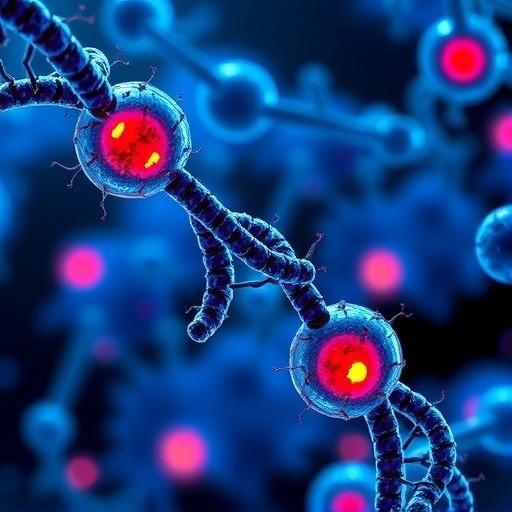In a groundbreaking study, researchers led by Chen et al. have unveiled innovative gene engineering strategies aimed at combating tumor antigen escape—a significant hurdle in the effectiveness of cell therapies. As the realm of oncology continues to evolve with the advancement of cell-based therapies, addressing the phenomenon of tumor antigen escape becomes paramount for enhancing patient outcomes. The study, published in the Journal of Translational Medicine, serves as a potential blueprint for next-generation cancer treatments.
Tumor antigen escape refers to the ability of cancer cells to evade detection and destruction by the immune system. This complex process is exacerbated by the heterogeneous nature of tumors, which often exhibit a varied expression profile of antigens. In light of this challenge, the research team focused on refining gene editing tools to permanently modify the surface antigens of tumor cells. By improving the antigen recognition capabilities of therapeutic cells, they aim to create a more targeted and efficient treatment modality for patients.
The investigation explored various gene editing technologies, including CRISPR-Cas9 and TALENs, to engineer T cells with enhanced recognition features. The dual focus was to not only modify existing T cell receptors but also to enhance the overall fitness of the modified T cells in the hostile tumor microenvironment. This meticulous engineering allows for sustained and robust responses against tumors, addressing the dual challenge of antigen variability and immune resistance.
Utilizing a series of preclinical models, the team meticulously demonstrated the efficacy of their engineered T cells. They administered the genetically modified cells into models harboring tumors with known antigen escape mechanisms. Remarkably, results showed a significant increase in tumor reduction and prolonged survival rates in subjects receiving the modified cells compared to those receiving standard therapies. The consistency of these findings underscores the potential of this approach in real-world settings.
Furthermore, the study highlights the implications of combining gene engineering strategies with existing therapeutic regimens. By integrating these advanced techniques into established treatment protocols, clinicians could substantially improve the effectiveness of cell therapies in refractory cases. This innovative method could likely redefine the prognoses for patients with advanced malignancies that currently have limited treatment options.
While promising, the authors also address the challenges and ethical considerations surrounding gene editing technologies. As the scientific community accelerates towards clinical applications, it is imperative to maintain a balanced dialogue about the implications of modifying human cells. By establishing clear guidelines and ethical boundaries, these scientific advancements can be harnessed responsibly for the betterment of patient outcomes without compromising safety.
Importantly, the study is not just a technical achievement; it serves as a clarion call for further research into the dynamic interactions between engineered cells and their tumor counterparts. Understanding how modified T cells navigate the complex tumor microenvironment will provide critical insights into optimizing these therapies for diverse cancer types. This understanding could lead to tailored therapies that dynamically adapt to the tumor’s evolving landscape.
The implications extend beyond individual cancer treatments; the methodology established within this research could pave the way for similar approaches in managing other diseases characterized by antigen variability. The versatility of the gene engineering techniques explored in this study signifies a broader applicability that could revolutionize treatment strategies across multiple therapeutic areas.
In terms of future research directions, a systematic investigation into the long-term effects of genetically modified T cells in human patients is crucial. Ongoing clinical trials will provide essential data on the safety, efficacy, and durability of these engineered therapies in a clinical setting. As researchers embark on these trials, the hope is to translate laboratory successes into meaningful advances in patient care.
In summary, Chen et al.’s pioneering work offers an exciting glimpse into the future of cancer therapy. By leveraging innovative gene engineering strategies to tackle tumor antigen escape, the research demonstrates the potential to significantly enhance the effectiveness of cell therapies. As the scientific and medical communities continue to unravel the complexities of cancer, studies like this provide a roadmap towards a new era of personalized and adaptive treatment options.
In essence, the exploration of cancer therapy against the backdrop of tumor antigen escape is a testament to human ingenuity in the face of formidable challenges. As ongoing research continues to build on the findings of this study, the ultimate goal remains clear: to enhance the quality of life and survival rates for cancer patients worldwide. The commitment to advancing cancer treatment through cutting-edge science underscores our relentless pursuit of knowledge—a pursuit that promises to reshape the future of oncology as we know it.
Subject of Research: Innovative gene engineering strategies to combat tumor antigen escape in cell therapy.
Article Title: Innovative gene engineering strategies to address tumor antigen escape in cell therapy.
Article References:
Chen, Y., Niu, S., Li, YR. et al. Innovative gene engineering strategies to address tumor antigen escape in cell therapy.
J Transl Med 23, 1227 (2025). https://doi.org/10.1186/s12967-025-07259-8
Image Credits: AI Generated
DOI: https://doi.org/10.1186/s12967-025-07259-8
Keywords: Gene engineering, tumor antigen escape, cell therapy, CRISPR-Cas9, TALENs, T cells, cancer treatment, immunotherapy.




